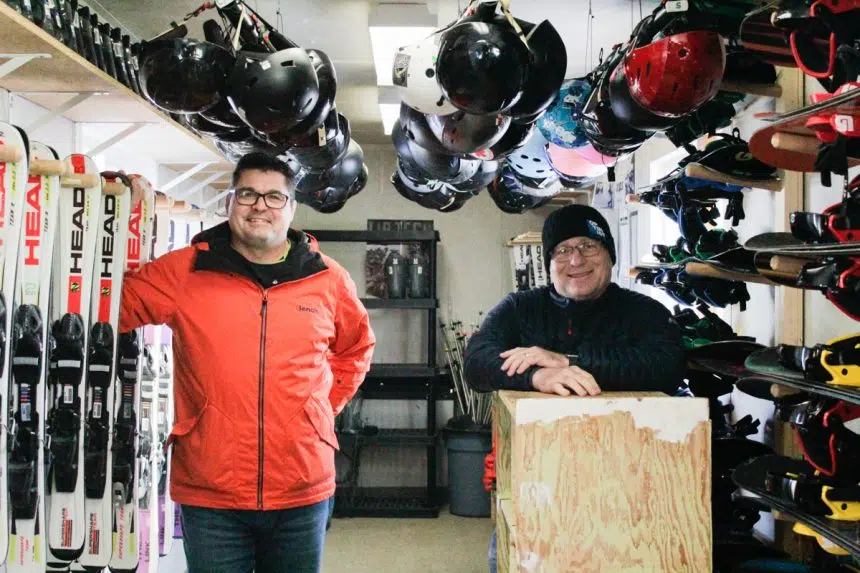Brad Sylvester and Rob Belyk want the next Mark McMorris to get their start on Optimist Hill.
That’s part of the reason why, after 54 years, the Optimist Club has decided to retire from its official Canada Day efforts in favour of a beginner snowhill in the middle of Saskatoon, among other reasons.
Sylvester was the former chair of the Optimist Canada Day celebrations. He held the position for about 15 years — until around 2016 — before passing on the torch to Belyk, the current chair.
The two co-chaired the July 1 festivities in Diefenbaker Park through 2016 and 2017, tackling Canada’s 150th birthday together. That year, Heritage Canada provided a massive Canadian flag to the club to use in its celebrations.
Sylvester remembered everyone singing O Canada as they brought the flag in front of the stage to spread it out. He called that moment “amazing.”
“And then the kids ran up,” Belyk interjected.
“And they grabbed onto the flag to hold it and then started waving it,” Sylvester finished. “That’s one of those moments I’ll never forget … That was a nice thing.”
Memories of July 1
Canada Day is a day perhaps even more special for Belyk and Sylvester than most, given their focused efforts on its annual success nearly year-round. For the past 20 years, Canada Day has been the club’s main event.
The all-day festivities included dignitaries, speeches, entertainment on the mainstage and, of course, fireworks. Through the years the event would evolve and grow, incorporating more moving parts and requiring more energy to plan and execute.
Belyk said cultural dancing, singing and entertainment have grown over the years, and the event also includes vendors, a flea market and various entertainments for kids, including displays for race cars and firetrucks.
“Anything that kids would like to go and crawl through, and firefighters loved it because they’d bring one of their pumper trucks down and the kids would get in the truck and put their hats on,” Belyk said.
Sometimes the police would attend with a squad car.
“Always something focused on families and trying to entertain families,” Sylvester summarized.
For some, Canada Day meant celebrating a new country.
“You could just see the joy in their face, coming to be Canadian,” Belyk said, remembering several new immigrants to the country enjoying the day.
The Optimist Club also worked to be respectful to the mistakes of the country, introducing reconciliation programs to support Indigenous people in attendance.
In the early 2000s, Sylvester remembers taking on the challenge of procuring an exceptionally large cake for July 1.
He connected with the Safeway on Circle Drive and talked staff into providing the cake.
“I said, ‘Let’s make it really big!’ ” Sylvester recalled. “So we had four slabs of cake on an eight-by-four sheet.”
That 16-foot-by-eight-foot cake was never replicated.
“We had so much cake left over, it was insane!” Sylvester said.
However, every year after, Safeway helped with thickly iced (smaller) cakes, and eventually transitioned to Canada flag cupcakes, which Belyk said were much easier for the mayor and other delegates to hand out to those attending.
Around 2016, the Royal Canadian Air Force started contributing flybys to the celebrations.
Belyk remembered that right around that time, the CF-18s passed overhead on one cloudy July 1. Then he got a text message that the planes were going to come back around.
“I thought, ‘That’s cool,’ ” Belyk said. “Five minutes later they flew really nice and low, almost burst all our eardrums … so I replied with a text, ‘That was awesome! Tell the pilots how great it was!’ ”
The response text came almost immediately: “I am the pilot.”
Belyk laughed at the memory, joking about the dangers of flying and texting.
Other memories like Bryan Trottier — the Val Marie product who played 18 seasons in the NHL for teams like the New York Islanders and Pittsburgh Penguins — paying a visit to the festivities came to mind for the two chairs.
He was a really nice and polite guy, Belyk said, though he was surprised nobody was interested in the hockey cards he brought. Instead, people wanted selfies.
There were some less enjoyable times, like the year where a woman was unfortunately inside a port-a-potty that was tipped by kids. But even that turned into an unexpectedly joyful memory.
“Some citizens came up to her and they comforted her and they gave her the pants that they were wearing, shared their clothes,” Sylvester said.
Belyk added: “That was something … We saw the worst in people and we also saw the best.”
It was rare an emergency would happen, though there was sometimes the unexpected conflict that would arise — like the year the speeches by dignitaries ran under time.
“When do politicians not talk for over their time limit?” Belyk asked with a grin.
He said he’d allotted three minutes to every person to welcome visitors to the park one year, kicking off the day. That was to be followed by the RCAF flyover at 10:55 a.m.
But the park was singing O Canada with those speeches wrapped by 10:35 a.m., leaving the emcees to improvise for 20 minutes.
“I was giving the old ‘drag it out’ sign and so they just told jokes and just did foolish things and I was the brunt of a lot of their jokes because of that. And then sure enough, exactly at the moment it was supposed to, the flyby went by,” Belyk said.
“That was one where I just shook my head.”
The worst parts of the day would happen if people elsewhere in the park started setting off fireworks while the club members were trying to light theirs.
For Belyk and Sylvester, the closure of the Optimist Club’s Canada Day chapter is bittersweet, but perhaps more sweet than bitter at this point. Sylvester said he’ll miss it, but he won’t.
“I’m now retired, I’m 62. My body doesn’t work the same as it did when I was 40,” Sylvester said, noting the ages of all 25 Optimist Club members continue to increase as well. “It was tough to get up the next couple of days.
“Part of the decision was, ‘OK, who’s taking over for Rob in three years?’ We’re all going to be three years older and we don’t have new blood in the club.”
As current Canada Day chair, Belyk is also retired at 59 and says he’s also starting to slow down physically — certainly to the point that changing garbage bags across a park on a major holiday every 15 minutes throughout the course of a night is no longer easy.
Three consecutive 18-hour days of setup, celebrations and cleanup now pose a more significant obstacle for members of the Optimist Club. Sylvester joked that each year, it takes him about a month to recover from the days-long ordeal.
“We just went, ‘It’s probably time for us to say we’re retired,’ ” Sylvester said.
Further, the club lost its title sponsor after a two-year COVID-19 hiatus from Canada Day festivities.
Belyk said the Canada Day budget for Saskatoon is between $60,000 and $80,000. While the club receives some funding from the Department of Canadian Heritage and does reap some revenue from vendors, its expenses are significant.
With costs for fencing, a mainstage, toilets, security, entertainment and — perhaps most immense — fireworks, Canada Day is no small (or cheap) undertaking.
The two-year pause also meant a 40 per cent revenue loss for the club, and Sylvester said it has exhausted all possible avenues trying to make up the funding it has lost.
That perfect storm of age, finances and new direction are the reasons behind the club’s retirement decision, which it announced in early December.

Rob Belyk (right) and Brad Sylvester with the Optimist Club stand in front of Optimist Hill on Dec. 15, 2021. (Libby Giesbrecht/650 CKOM)
What’s next for Canada Day in Saskatoon?
Both Belyk and Sylvester maintain that, in many places, Canada Day festivities are a responsibility assumed by a town or city.
“We did it for 54 years on behalf of the city when we were asked to in 1967,” Sylvester recalled.
When the Optimist Club first became involved in the July 1 celebrations, it was because the City of Saskatoon asked that the club host a breakfast in Rotary Park. From there, the program only grew and eventually migrated to Diefenbaker Park in the ’80s, Sylvester said. Now, the men are hoping the city will step up to see that the yearly festivities continue.
That doesn’t mean the Optimist Club is going to fully excuse itself from the day, though.
Belyk said he’s in talks with various people at the moment to see who will carry on Saskatoon’s Canada Day celebrations.
“I am going to miss it, absolutely. But I will add that the wheels are in motion,” he said.
“We’re going to help … We’re stewards of the community and we’re here and we’re just retiring from that but we’re not leaving it,” Sylvester added.
The time they’re not spending on planning July 1, though, will be rechanneled into their newest endeavour — Optimist Hill.
The project has a $4-million pricetag that the club has been fundraising to complete. There’s a plan to build a village in addition to the hill, where people were able to ski, snowboard and snow-tube again as of Dec. 18.
“We’re not walking away from what we’re doing in the city, we’re just moving from that project to this project,” Sylvester explained.
COVID-19 has complicated the work of the club on the hill, too. Sylvester said the facilities didn’t open its first year until January and then only operated 28 days before COVID closed it down for two years.
“When I get to the top of the hill and it’s a nice busy day, it’s just exciting to be here,” he said.
Belyk and Sylvester both said they’re proud of the legacy the Optimist Club is leaving behind with their years of service in the form of Saskatoon’s Canada Day celebrations. They’re now very excited about what they hope will be the club’s enduring legacy — and the chance to continue serving Saskatoon — in the form of Optimist Hill.
“This is truly our legacy,” Sylvester said.







